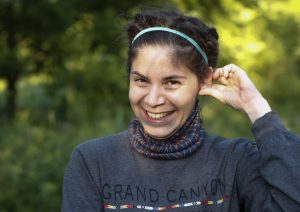Interested in science communication? Look no further. The AAAS Mass Media Science & Engineering Fellowship carries out the mission to increase public understanding of science and technology. Over the past decades, more than 700 scientists have gone through the 10-week summer program and explored the realm of science journalism. ASPB has been a proud sponsor of the fellowship and would love to foster our community members to become engaging science communicators. We interviewed our recent ASPB/AAAS fellows to hear about their experiences in the program as well as how the program pivoted their careers and perspectives.
The deadline for the 2021 application is on January 1, 2021 at 11:59 EST. Students and postdoc (or within one year of completion) are encouraged to apply.
Lorena Villanueva-Almanza (2020)

While attending ComSciCon San Diego in 2018, the AAAS Mass Media Science & Engineering Fellowship was recommended to Lorena by Ramin Skibba, and it reminded her that she had heard about the fellowship from a friend of hers (Pedro Piqueras) who was a fellow in 2016. She applied in 2018 but didn’t get selected. The next year, she reached out to many former fellows to help strengthen the application; it was successful and she spent 10 weeks reporting for the Indianapolis Star. Because of the pandemic, she was originally working remotely, but she decided to fly to Indianapolis even when the newsroom was still closed. Two days after her arrival, she and a photojournalist Grace Hollars interviewed a group of researchers who study Indiana bats in one of the longest study sites on bats in the world. The on-site reporting gave Lorena a better sense of the study site, which she had only read about from academic papers, as well as better interactions with the research team. Another reporting experience revolutionized Lorena’s science writing. She interviewed Dr. Ximena Bernal who lead the studies on Panamanian pug-nosed frogs and how their auditory signals were perceived by a potential mate or predator. “I, being Mexican and Bernal, Colombian, I admire her and her work. During our talk, she mentioned how important it was for her to take students to Panama so that they experienced a different culture,” recounted Lorena. Dr. Bernal’s words resonated with her, and she wishes to use her science writing to bridge Latin America and the US.
The fellowship confirmed Lorena’s passion for writing: “With every story, I gained confidence on my skills and experience as a Latina scientist and aspiring writer. I could feel myself grow personally and professionally every week.” After the fellowship, she started freelance writing for outlets in the US and Mexico. She said, “My hope is to make science and science writing a more welcoming space to Spanish-speaking communities, while at the same time, highlighting their achievements.”
